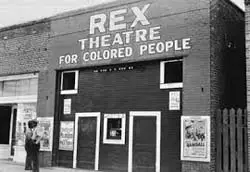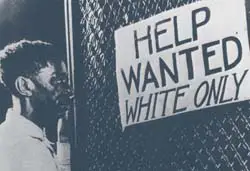Jim Crow Laws
“Jump Jim Crow” was the name of a 19th century song that created a stereotype about African Americans. It became the term that was used for the type of laws that allowed oppression and racial discrimination that was common in the United States.


Racial discrimination may have been most well-known as a southern state situation, but in reality it occurred in all of the states. The oppression included state approved discrimination as well as violence. Many of the ‘Jim Crow Laws’ were set in place after the Civil War and during the reconstruction of the southern states and were allowed on both the state and local levels. Those Black Americans that had been former slaves, but were now considered free, had limited rights under the Jim Crow Laws.

This means that if a local area passed a law that was based on discrimination, it was allowed. The Jim Crow Laws basically offered African Americans a ‘separate by equal’ status. They had equality, only as far as the local or state laws permitted. The reason these laws were passed is due to the fact that the white governing communities thought that Black Americans were inferior to them.


Some of the Jim Crow Laws that were passed were heavily based on segregation. This is the separation of Black Americans from the white population in many of the daily activities and lifestyle actions. This included: separate schools, drinking fountains, bathrooms, hotels, public libraries, restaurants and public transportation. The United States military was also segregated, allowing Black American soldiers to serve in ‘Black Only’ infantry. There were also Jim Crow laws forbidding Black Americans to participate in or attend sporting events. Even Black and White Americans working together in the same office was considered against the law in some areas.

President Woodrow Wilson was a southerner and during his presidency, supported the Jim Crow Laws of any state or area. The government turned away at every complaint or protest, even when the Jim Crow Laws allowed murder without the benefit of a fair trial. Wilson appointed southern representatives to his cabinet and they made sure that laws were not passed to allow any additional freedoms to the Black Americans.

Some of the most important Jim Crow Laws had to do with voting rights. Many of the southern states passed laws requiring a voter to be able to pass a literacy test before they were given the approval to vote. Since many of the Black Americans still lived in the south and most were not literate due to previous laws against educating slaves, a majority of the Black Americans could not vote. Additional Jim Crow laws on voting added a ‘polling tax’ which was a payment that allowed you to vote at the voting polls. The lower income Black Americans could not pay the ‘polling tax’ and this reduced their voting abilities.

I wasn’t until 1953, when attorney Thurgood Marshall, brought a legal case to court known as Brown v. Board of Education of Topeka, that the NAACP (National Association for the Advancement of Colored People) had their day in trial. The court case that Marshall won over ruled all laws, local or state, that would be considered “Jim Crow Laws” and listed them as unconstitutional.




